Diplomatic Bluebook 2022
Chapter 2
Japan's Foreign Policy by Region
3 Collaboration with European Regional Institutions, and the Asia-Europe Meeting (ASEM)
(1) Cooperation with the North Atlantic Treaty Organization (NATO)
As a military alliance that aims at providing collective defense for its 30 member countries, NATO2 provides collective defense for its member countries, and also provides engagement in cooperative security efforts with non-EU countries and organizations and in crisis management outside of the region that could pose a direct threat to the security of the territories and peoples of NATO member countries, including security-keeping operations and counter-terrorism efforts. In Afghanistan, NATO had been conducting its Resolute Support Mission (RSM) since 2015, which ended with the withdrawal of U.S. troops in August.
NATO has been increasingly interested in the Asia-Pacific region in recent years. At the Meeting of NATO Ministers of Foreign Affairs held online in December 2020, a statement by Foreign Minister Motegi was read out by the Ambassador of Japan to NATO. This was done for the first time by a Japanese Minister for Foreign Affairs. Foreign Minister Motegi pointed that the current security environment in East Asia has become increasingly severe, and that NATO is a reassuring partner for the FOIP vision promoted by Japan. In the Communiqué issued at the NATO Summit in June, it was announced that NATO would enhance dialogue and cooperation with its partners in the Asia-Pacific, including Japan.
Japan and NATO are partners that share fundamental values, and both have been taking specific steps toward collaboration based on the Individual Partnership and Cooperation Programme (IPCP) (revised in May 2018 and June 2020), which was signed in May 2014. Japan has participated in NATO's Cyber Coalition, as well as training exercises related to humanitarian assistance and disaster relief (HA/DR) as an observer. Japan has also dispatched a female SDF official to the NATO headquarters for the fourth time since December 2021 in order to promote Japan-NATO cooperation on cyber issues, Women, Peace and Security (WPS) and other fields. Through the Partnership for Peace (PfP) Trust Fund, a project that aims to promote arms control and disarmament, as well as democratization and regional stabilization, utilizing NATO's specialized military expertise, Japan has also been providing support to process unexploded ordnance in Ukraine, and to help capacity building for demilitarization of Serbia's Ministry of Defense arsenal.
- 2 NATO: North Atlantic Treaty Organization
See the MOFA website for details: https://www.mofa.go.jp/mofaj/area/nato/index.html
(2) Cooperation with the Organization for Security and Co-operation in Europe (OSCE)
OSCE is a regional security organization with 57 participating States across Europe, Central Asia and the Caucasus region, and North America, that works to bridge differences between member countries and foster trust through conflict prevention, crisis management, and post-conflict recovery and reconstruction in these regions through a comprehensive approach. Japan has cooperated with OSCE activities since 1992 as an Asian Partner for Co-operation. Japan provides support for preventing terrorism by means such as strengthening border patrol in Afghanistan and Central Asia through the Border Management Staff College (a capacity building organization) in Tajikistan, and also gives support in conducting election monitoring as well as to the projects that promote women's social advancement. Considering that the OSCE plays an important role in improving the situation in Ukraine, Japan has been providing financial support and dispatching experts to the OSCE Special Monitoring Mission (SMM) (experts have been dispatched intermittently since August 2015). At the Ministerial Council held in Sweden in December, Ambassador of Japan to Austria Mizutani Akira participated and stated that Japan will continue to support capacity-building for border control of the OSCE participating states , and will continue to actively cooperate with the OSCE upon marking the 30th anniversary of the Japan-OSCE partnership in 2022.
(3) Cooperation with the Council of Europe (CoE)
The CoE is an international organization comprising 47 member states in Europe which has played a key role in establishing international standards in areas concerning democracy, human rights, and the rule of law. As the CoE's sole observer country in Asia, Japan has contributed to the CoE, including by providing knowledge and supporting the holding of meetings. There were participants from Japan who gave policy statements at the side event of the Meeting on AI in July, at the World Forum for Democracy in November, and at the Octopus Conference 2021. Besides this, as 2021 marked the 25th anniversary of Japan's appointment as an observer country, cherry blossom trees were donated and planted at the CoE headquarters, and a special website was opened to issue congratulatory messages from the Japanese government and Council of Europe officials.
(4) Cooperation through the Asia-Europe Meeting (ASEM)
ASEM was established in 1996 as the sole forum for dialogue and cooperation between Asia and Europe. Its members currently comprise 51 countries and two institutions, and works through summit meetings, ministers' meetings including Foreign Ministers' meetings, seminars, and other activities focused on three pillars, namely (1) politics, (2) economy, and (3) society and culture.
On November 25 and 26, the 13th ASEM Summit was held online under the chairmanship of Cambodia. Prime Minister Kishida attended the Summit from Japan, and expressed his determination to aim for the realization of a new form of capitalism, to actively contribute to the resolution of global challenges through measures against COVID-19 and climate change, and to lead international efforts to “build back better” from COVID-19. Furthermore, Prime Minister Kishida stated that Japan would play an active role in strengthening rules-based connectivity in cooperation with other countries toward the realization of FOIP, and pointed out the importance of implementing quality infrastructure investment in accordance with international principles. In regard to the regional situation, he expressed strong concern over nuclear and missile activities by North Korea, and said that Japan would cooperate with ASEM partners to respond to North Korea, including for the abductions issue. He strongly opposed that unilateral attempts to change the status quo and activities to increase tensions had been escalated and actions against the rule of law had been seen in the East China Sea and the South China Sea. He also expressed strong concern over the situation in Hong Kong and the human rights situation in Xinjiang.
The Chair's Statement of the 13th ASEM Summit reaffirmed the importance of the partnership between Asia and Europe. It also mentioned the complete, verifiable, and irreversible dismantlement (CVID) of North Korea's nuclear and other weapons of mass destruction and ballistic missile programs, the immediate resolution of the abductions issue, full compliance with international law, including the UN Convention on the Law of the Sea, and ensuring maritime security. In light of the spread of COVID-19, the Phnom Penh Statement on the post-COVID-19 Socio-Economic Recovery, issued in conjunction with the Chair's Statement, communicated priority measures for recovery of Asian and European countries, including international cooperation on COVID-19 vaccines, Data Free Flow with Trust (DFFT), and further climate change measures.
Japan has supported the Asia-Europe Foundation (ASEF), ASEM's only permanent institution, with its project of stockpiling personal protective equipment (PPE) and antiviral drugs to combat infectious diseases, cooperating in the emergency transportation of stockpiled supplies to ASEM partners, as well as the implementation of capacity building workshops and public health network projects. From May to October, ASEF stockpiled supplies were provided to Cambodia, Laos, Bangladesh, Brunei, and Viet Nam. In addition, Japan contributed to the activities of ASEM by assisting with the online Environment Forum co-hosted by the ASEF and related organizations, and making financial contributions to the ASEF.
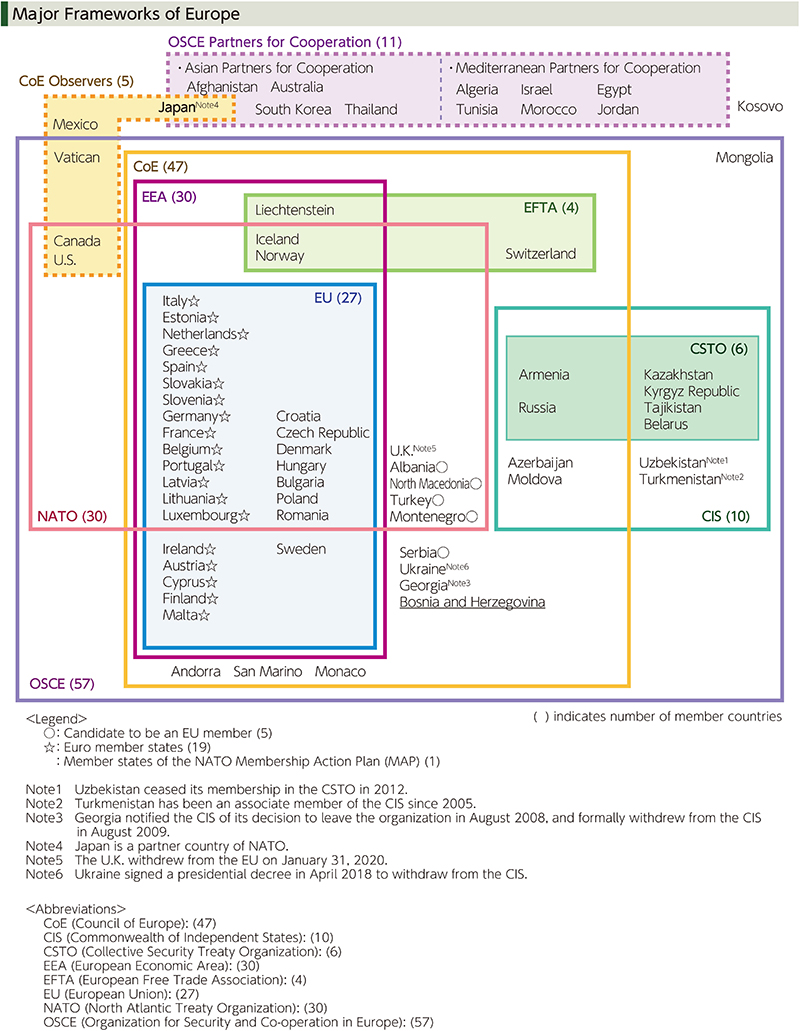
Other European Regions
Nordic countries
Iceland: In May, the 3rd Arctic Science Ministerial Meeting, co-hosted by Iceland, was held in Tokyo, which was the first one to be held in Asia. The meeting focused on promoting Arctic research through international cooperation.
Sweden: In March, Prime Minister Suga held a telephone call with Prime Minister Stefan Löfven, and they shared the view to further enhance bilateral relations in a wide range of fields including the economy, climate change and digitalization. Prime Minister Löfven agreed to cooperate with Japan toward the realization of a “Free and Open Indo-Pacific,” and both leaders shared the view to cooperate on regional affairs, including China and Myanmar.
Denmark: In November, Foreign Minister Hayashi met Minister for Foreign Affairs Jeppe Kofod, who was visiting Japan. The two ministers welcomed the progress made in the coordination of the “Joint Strategic Work Program” aimed at developing the “Strategic Partnership” that was agreed upon by the leaders of the two countries in 2014 , into more concrete cooperation. The ministers confirmed further cooperation in the realization of a “Free and Open Indo-Pacific” , as well as in international fora, such as measures on climate change. The two ministers also exchanged views on regional affairs and shared the view to strengthen cooperation as like-minded countries that share the fundamental values.
Norway: Prime Minister Kishida became a member of the Norwegian-led “High-Level Panel for a Sustainable Ocean Economy,” and at its third meeting in November, he introduced Japan's efforts and expressed Japan's contribution to building a sustainable ocean economy.
Finland: Foreign Minister Motegi held talks with Minister for Development Cooperation and Foreign Trade Ville Skinnari, who was visiting Japan. The two ministers welcomed progress in bilateral cooperation, especially in digital and cyber fields, and shared the view to strengthen cooperation in international arenas, including measures against COVID-19. They also exchanged views on cooperation in the Indo-Pacific and concurred on the importance of realizing a free and open international order based on the rule of the law.
Benelux countries
The Netherlands: In June, on the occasion of the G20 Foreign Ministers' Meeting in Italy, Foreign Minister Motegi held talks with Minister of Foreign Affairs Sigrid Kaag. The two ministers affirmed that they would strengthen cooperation toward the realization of a “Free and Open Indo-Pacific”. Furthermore, the Netherlands dispatched the frigate Evertsen to the Indo-Pacific as part of the UK's Carrier Strike Group and also made a port call in Japan, in accordance with its own Indo-Pacific guidelines announced in 2020.
Belgium: During the COVID-19 pandemic, Belgium played a major role in supplying vaccines to the world with its vaccine development and production bases, trading ports, and international airports. Regarding relations with Japan, Prime Minister Suga and Foreign Minister Motegi issued messages of condolences regarding the flood damage caused by torrential rains in southern Belgium in July.
Luxembourg: In July, His Royal Highness Grand Duke Henri visited Japan to attend the opening ceremony of the Olympic Games Tokyo 2020.
San Marino: Following the general election of the Grand and General Council of San Marino (equivalent to the parliament) held on December 8, 2020, the Beccari administration, headed by Luca Beccari, the Minister of Foreign Affairs, International Economic Cooperation and Telecommunications, took office on January 8, 2021. In July, Captains Regent Gian Carlo Venturini and Marco Nicolini visited Japan to attend the opening ceremony of the Olympic Games Tokyo 2020.
Portugal: In July, Minister in charge of International Exposition Inoue visited Portugal and held talks with Minister of Foreign Affairs Augusto Ernesto Santos Silva. Minister Santos Silva expressed Portugal's participation in the Osaka-Kansai Expo, while Minister Inoue welcomed Portugal's announcement of its participation and affirmed cooperation with Portugal for the success of the Expo.
Monaco: In July, His Royal Highness Prince Albert II visited Japan to attend the opening ceremony of the Olympic Games Tokyo 2020.
Baltic countries
Estonia: In July, Foreign Minister Motegi became the first Japanese Foreign Minister to visit Estonia, where he held talks with Minister of Foreign Affairs Eva-Maria Liimets and paid a courtesy call to Prime Minister Kaja Kallas. Both sides confirmed that they would further promote broad cooperation on the occasion of the visit and the 100th anniversary of the friendship between Japan and Estonia in 2021. Estonia expressed its support for a “Free and Open Indo-Pacific” and shared the view on the importance of like-minded countries to maintain and strengthen a rules-based free and open international order. In August, Prime Minister Suga held a summit meeting with President Kersti Kaljulaid, who was visiting Japan, and concurred on cooperation in the digital and cyber fields, and the cooperation toward the realization of a “Free and Open Indo-Pacific.”
Latvia: In July, Foreign Minister Motegi became the first Japanese Foreign Minister to visit Latvia, where he held a talk with Minister of Foreign Affairs Edgars Rinkevics and paida courtesy call to Prime Minister Krišjanis Karinš. Minister Motegi confirmed with both ministers to further promote broad cooperation on the occasion of the visit and the 100th anniversary of the friendship between Japan and Latvia in 2021. The Latvian side expressed its strong support for the realization of a “Free and Open Indo-Pacific” and shared the view on the importance of like-minded countries to maintain and strengthen a rules-based free and open international order.
Lithuania: In July, Foreign Minister Motegi visited Lithuania and held a talk with Minister of Foreign Affairs Gabrielius Landsbergis and paid a courtesy call to Prime Minister Ingrida Simonyte. Minister Motegi confirmed with both ministers to further promote broad cooperation on the occasion of the visit and the 100th anniversary of their friendship in 2022. The Lithuanian side expressed its support for a “Free and Open Indo-Pacific” and shared the view on the importance of like-minded countries to maintain and strengthen a rules-based free and open international order.
Ireland: In December, Foreign Minister Hayashi held a video conference with Minister for Foreign Affairs and Defense Simon Coveney, where the ministers shared the view to further promote cooperation to develop bilateral relations, including in the political and economic fields. The ministers also exchanged views on regional affairs and shared the view to strengthen cooperation among like-minded countries toward the realization of a “Free and Open Indo-Pacific.”
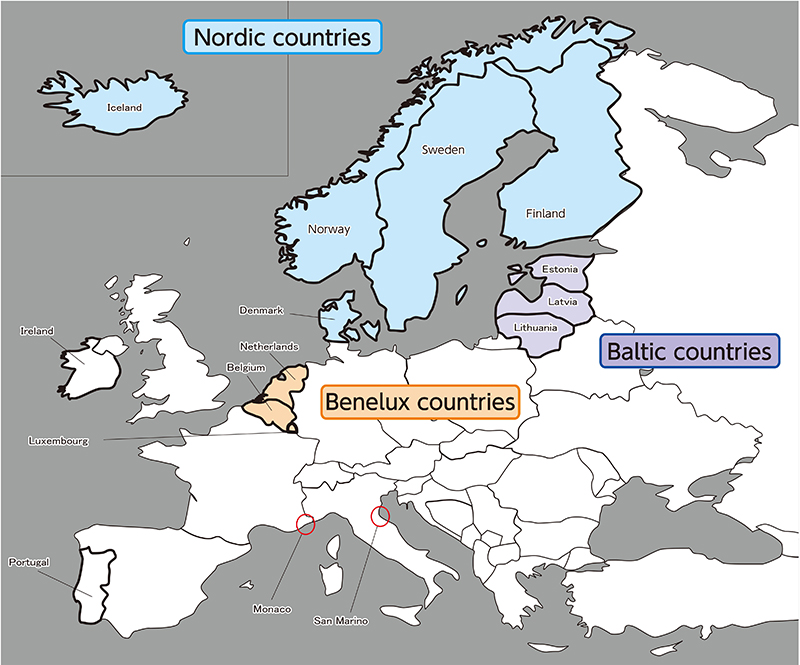
V4
Bilateral relations between Japan and the V4 countries of Poland, Hungary, Slovakia and the Czech Republic have a long history and are traditionally friendly. During Foreign Minister Motegi's visit to Warsaw in May, he attended the 7th “V4 plus Japan” Foreign Ministers' Meeting, where the ministers confirmed their cooperation toward the realization of a “Free and Open Indo-Pacific” and their cooperation in assistance for the Western Balkans.
Poland and Hungary are increasingly at odds with the EU over “the rule of the law,” delaying EU approval of recovery funds for both countries. The passage of LGBT-related legislation in Hungary in July and a ruling by the Polish Constitutional Court in October on the relationship between the Constitution and EU law and other decisions have created problems concerning the basic values of the EU and the sovereignty of individual countries.
Poland: Japan was active in high-level dialogues, including a telephone call between Prime Minister Suga and Prime Minister Mateusz Morawiecki in March, a foreign ministers' meeting during Foreign Minister Motegi's visit to Poland in May, and President Andrej Duda's visit to Japan in July, in which the two countries affirmed to strengthen their strategic partnership relations.
Hungary: Foreign Minister Motegi held a meeting with Minister of Foreign Affairs and Trade Péter Szijjártó during his visit to Japan in March and during Foreign Minister Motegi's visit to Warsaw in May. Both ministers agreed to promote “V4 plus Japan” cooperation under Hungary's V4 Presidency (V4 Presidency since July). The ministers also welcomed new investments by Japanese companies and shared the view to strengthen economic relations.
Slovakia: Foreign Minister Motegi visited Warsaw in May and held a meeting with Minister of Foreign and European Affairs Ivan Korčok. The ministers welcomed new investment by Japanese companies and agreed to strengthen economic relations.
Czech Republic: Foreign Minister Motegi visited Warsaw in May and held a meeting with Minister of Foreign Affairs Jakub Kulhánek. The ministers signed the “Action Plan for Cooperation between Japan and the Czech Republic for the period of 2021-2025” and confirmed the strategic partnership between the two countries.
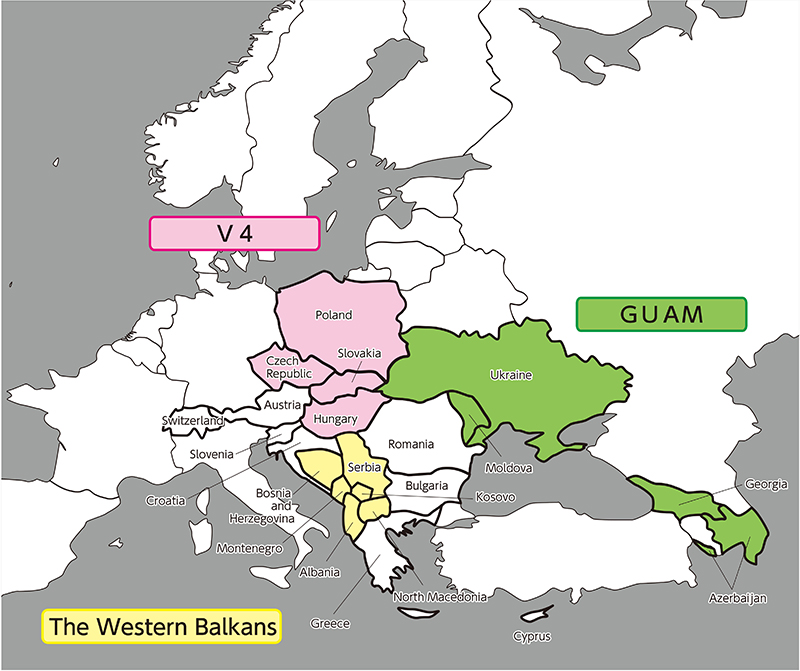
The Western Balkans
Although there still remains ethnic conflict, overall progress can be seen for stability and development in the Western Balkan region owing to each country's commitment to reforms toward EU membership. Prime Minister Abe visited Serbia in January 2018, the first visit ever by a Japanese Prime Minister. During the visit, he announced the “Western Balkans Cooperation Initiative” designed to advance cooperation with the Western Balkans (Albania, Kosovo, Serbia, Bosnia and Herzegovina, North Macedonia and Montenegro), which aims for EU membership. Japan has promoted cooperation with the entire Western Balkan region in areas such as youth and economic exchanges. In April, as a collaborative project with the West Balkan Fund established by the governments of the West Balkans, participants from each West Balkan country participated online in the report on the “Impact of COVID-19 on sustainability of Civil Society Organizations in the Western Balkans Region.” In May, Foreign Minister Motegi visited Bosnia and Herzegovina, and in July Kosovo President Vjosa Osmani-Sadriu and Montenegro Prime Minister Zdravko Krivokapic visited Japan.
GUAM (Georgia, Ukraine, Azerbaijan, Moldova)
GUAM was established by four countries of the former Soviet Union to promote democracy and stable economic development. Japan established the “GUAM+Japan” cooperation framework in 2007, and holds foreign minister-level and vice-minister-level meetings, as well as theme-based workshops with professionals and experts from GUAM countries, as a project to invite visitors to Japan. Japan places importance on ensuring that fundamental values take root in the international community through the stability and economic development of GUAM countries.
Slovenia: In April, Foreign Minister Motegi visited Slovenia, which will hold the EU Presidency in the second half of 2021, and met Minister for Foreign Affairs Anze Logar, and paid courtesy calls to President Borut Pahor and Prime Minister Janez Jansa. The two countries took the opportunity of the 30th anniversary of the establishment of diplomatic relations in 2022 to agree to develop relations in the areas of economic development, Society 5.0 and cybersecurity. They also agreed to cooperate toward integrating the Western Balkans into the EU under the “West Balkan Initiative.”
Romania: Japan and Romania coordinated their efforts to sign a strategic partnership document in 2021, the 100th anniversary of the establishment of diplomatic relations.
Bulgaria: Since 2018, Japan has promoted cooperation with Bulgaria under the “Western Balkans Cooperation Initiative.” In November, Japan and Bulgaria co-hosted the second Western Balkans Workshop on Seismic Risk Challenges.
Croatia: With bilateral relations gaining momentum from the mutual visits of foreign ministers in 2019 and the telephone call between Foreign Minister Motegi and Minister for Foreign Affairs Gordan Grlic Radman in 2020, further progress in bilateral relations, including in the economic sector, is expected ahead of the 30th anniversary of the establishment of diplomatic relations in 2023.
Austria: Various events were held in both countries in 2019, the 150th anniversary of exchanges with Austria, and visits to Japan were made by Chancellor Sebastian Kurz and other officials. In September 2020, Prime Minister Abe held a telephone call with the Chancellor.
Switzerland: In July 2021, President Guy Parmelin visited Japan for the opening ceremony of the Olympic Games Tokyo 2022 and held a summit meeting with Prime Minister Suga. Also in July, a protocol to amend the tax treaty was signed, and a new Swiss Consulate in Osaka was established.
Greece: Japan continues to maintain stable and good relations after the 120th anniversary of the Treaty of Amity, Commerce and Navigation between Japan and Greece in 2019. Further strengthening of relations, including economic relations, is expected in the future.
Cyprus: Following the opening of the Embassy of Japan in Cyprus in January 2018, the Embassy of Cyprus in Tokyo was opened in September 2019. Further strengthening of relations is expected ahead of the 60th anniversary of the establishment of diplomatic relations in 2022.
After World War I and against the backdrop of the Russian Revolution, Estonia, Latvia, and Lithuania declared independence from the Russian Empire, and became republic countries after international recognition. Japan recognized the then Estonia and Latvia in 1921 and Lithuania in 1922. 100 years later, Japan celebrated the 100th year anniversary of friendship with Estonia and Latvia in 2021, and with Lithuania in 2022, further developing the friendly relations between Japan and the Baltic states.
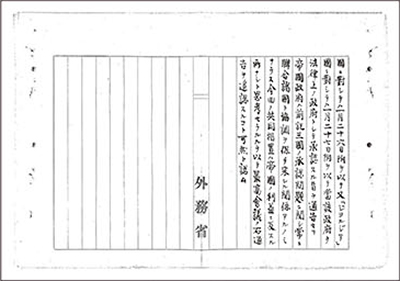
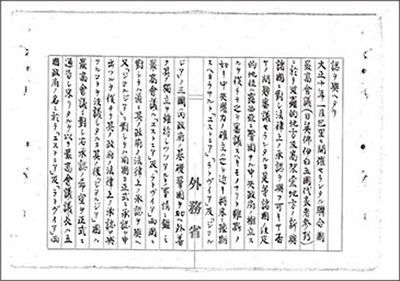
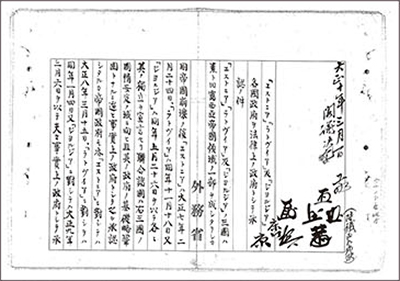 Cabinet decision of March 1, 1921, legal recognition of the Governments of Estonia, Latvia, and Georgia.
Cabinet decision of March 1, 1921, legal recognition of the Governments of Estonia, Latvia, and Georgia.In 1929, a Japanese legation was established in the Latvian capital Riga, which played an important role for gathering information about the situation in Europe. In addition, a consulate was opened in Kaunas in Lithuania, where Vice-Consul Sugihara Chiune issued “Visas for Life” that saved the lives of many Jewish people during World War II. The Baltic states were subsequently annexed into the Soviet Union during World War II, but in 1990, they declared their independence or transition to independence from the Soviet Union. In the following year, 1991, Japan again recognized the current Baltic states, which became independent as the Republic of Estonia, the Republic of Latvia, and the Republic of Lithuania and established diplomatic relations with them. Since then, the Baltic states have played active roles in the international community as members of Europe, and they are important partners to Japan, sharing fundamental values. Bilateral relations have grown steadily and in 2007, Their Majesties the Emperor and Empress (of the time) visited the Baltic states, and in 2018, Prime Minister Abe made the first visit to the Baltic states by a Japanese Prime Minister.
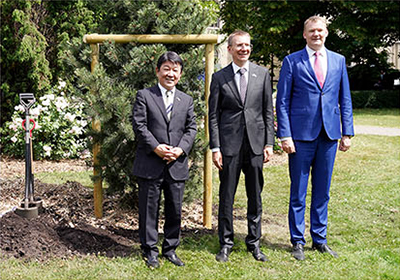 Foreign Minister Motegi planting a tree during his visit to Latvia with Minister of Foreign Affairs Rinkēvičs (center)
Foreign Minister Motegi planting a tree during his visit to Latvia with Minister of Foreign Affairs Rinkēvičs (center)In 2021, frequent high-level visits between Japan and the Baltic states took place. In January, Prime Minister Suga sent a video message to the “Centenary of the International de jure Recognition of the Republic of Latvia,” and in July, Foreign Minister Motegi made the first visit to the Baltic states by a Japanese Foreign Minister. In August, President Kaljulaid of Estonia and the wife of President Levits of Latvia respectively visited Japan on the occasion of the Olympic and Paralympic Games Tokyo 2020. The meetings held on the occasion of these visits affirmed the friendly relations between Japan and the Baltic states, which is to celebrate the 100th anniversary. Furthermore, both sides concurred on promoting cooperation on the common issues of the international community as like-minded countries, such as realizing a “Free and Open Indo-Pacific (FOIP).”
Commemorative events between Japan and the Baltic states were affected by the COVID-19 pandemic, however, some events were successfully held by adapting to the pandemic situation and taking appropriate infection control measures, such as a kimono exhibition in Estonia from June to November, and an digital ukiyoe (woodblock prints) exhibition in Latvia from October to December. In addition, in November “The Edo Ukiyo-e Woodblock Prints” Webinar, Japan Brand Program, was held in the two countries.
The Baltic states have also been developing as European logistics hubs. Large-scale infrastructure projects are underway to strengthen integration with western Europe, and they are actively strengthening economic relations with Japan. The Government of Japan intends to provide support in order to contribute to strengthening the unity of Europe by promoting economic connectivity. On the occasion of the 100th anniversary of friendship, we will further strengthen economic and cultural exchange to make the Baltic states become more familiar to the people of Japan.
Amid the increasing severity of the security environment of East Asia and the growing uncertainty in the international community, in order to realize a “Free and Open Indo-Pacific (FOIP),” strengthening cooperation with like-minded countries that share fundamental values has become extremely important. 2021 was the year in which Europe, who has not necessarily displayed a strong interest in the Indo-Pacific region due to the geographical distance, began to demonstrate its growing interest and engagement in the region.
Momentum has been growing for formulating independent strategies on the Indo-Pacific by the European Union (EU), following France, which holds territories in the South Pacific, and the Netherlands and Germany, which have strong historical and economic ties with Asia. Against this backdrop, Foreign Minister Motegi attended a meeting (in virtual format) of the EU Foreign Affairs Council in January. As the first Japanese foreign minister to attend the meeting, he explained Japan's stance and initiatives on FOIP. Thereafter, the EU issued a Joint Communication on the EU Strategy for Cooperation in the Indo-Pacific in September, clearly setting out its policy to cooperate with partners in the Indo-Pacific, including Japan. Furthermore, Foreign Minister Hayashi attended (in virtual format) the Ministerial Forum for Cooperation in the Indo-Pacific, held in February 2022 and co-hosted by the EU and France, which held the presidency of the Council of the EU for the first half of the year. At the meeting, Foreign Minister Hayashi emphasized the importance of strengthening cooperation with partners. The North Atlantic Treaty Organization (NATO) has also touched on expanding cooperation with Asia-Pacific partners, including Japan, in the outcome document of the NATO Summit held in June. These show that NATO is becoming a reassuring partner toward the realization of the FOIP vision.
In its strategy document titled “Global Britain in a Competitive Age,” published in March, the UK also set out policies aimed at deepening its engagement with the Indo-Pacific region.
Cooperation between Japan and Europe in the Indo-Pacific region covers a wide range of areas. The aforementioned Joint Communication published by the EU sets out a total of seven priority areas in which it will strengthen cooperation with partners, including Japan. This includes, for example, the digital sector, in addition to the green sector and connectivity, which Japan and the EU have already been cooperating on. Japan has also shared the view to advance cooperation with many European countries in areas such as response to COVID-19, climate change, digitalization, and economic security.
Particularly in the field of security, European countries have been demonstrating their firm policy of strengthening engagement with the Indo-Pacific, through concrete means such as deploying naval vessels to the region. France has deployed fleets repeatedly, held joint exercises with Japan and participated in the monitoring of illegal ship-to-ship transfers. In particular, when the training fleet “Jeanne d'Arc” called at Japan in May, a joint exercise was conducted with the participation of the U.S. and Australia. In relation to the UK, a carrier strike group, composed of the HMS “Queen Elizabeth” aircraft carrier and British, Dutch, and U.S. naval vessels, made a port call in Japan and conducted bilateral and multilateral joint exercises. This demonstrated the UK's unwavering engagement with the region. Germany is also strengthening its engagement with the Indo-Pacific through the port call in Japan by the frigate “Bayern” and its participation in bilateral and multilateral exercises, as well as in the monitoring of illegal ship-to-ship transfers for the first time.
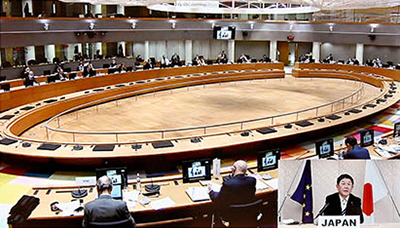 Foreign Minister Motegi in attendance at the EU Foreign Affairs Council and explaining the “Free and Open Indo-Pacific (FOIP)” vision (January)
Foreign Minister Motegi in attendance at the EU Foreign Affairs Council and explaining the “Free and Open Indo-Pacific (FOIP)” vision (January)Amid significant changes to the balance in the international community, strengthening cooperation with European countries that share fundamental values with Japan, such as the rule of law, is becoming increasingly important toward the realization of FOIP, as well as in upholding and strengthening a free and open international order based on the rule of law. Japan welcomes the greater interest and engagement in the Indo-Pacific shown by Europe in 2021. At the same time, Japan aims to continue working closely with the region to ensure that this interest and engagement remains steadfast.


